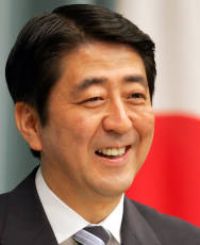Japan's Shinzo Abe to resign after election defeat
The Prime Minister of Japan Shinzo Abe meets multiple calls to resign after his Liberal Democratic Party defeated in the elections, which may cause a major Cabinet overhaul.

Voter outrage over millions of missing pension records and a series of political scandals stripped Abe's coalition of its majority in parliament's 242-seat upper house, while handing the opposition huge gains. The defeat was the clearest proof yet of Abe's tumbling fortunes and a dramatic reversal of the stellar support he enjoyed after taking office less than a year ago.
Newspaper editorials urged Abe to resign in the face of the public's revolt.
"Voters gave a clear failing mark," the Asahi newspaper said. "The prime minister should face the results seriously and step down."
The Tokyo and Mainichi newspapers meanwhile called on Abe to disband parliament's lower house for snap elections that could put a new premier in office.
"You have yet to be baptized in a general election," the Tokyo Newspaper said in an editorial addressed to the beleaguered prime minister. "We call for an election to be held promptly to give voters the opportunity to make their choice."
Official election results released early Monday showed the LDP and its junior coalition partner, the New Komeito, with a total of 103 seats - a 30-seat loss that left it far short of the 122 needed to control the house. The main opposition Democratic Party grabbed 112 seats, up from 81.
Only 121, or half, of the upper chamber's 242 seats were up for grabs in Sunday's polls.
Abe accepted responsibility for the loss hours after polls closed Sunday night, but refused to step down.
"I must push ahead with reforms and continue to fulfill my responsibilities as prime minister," Abe said.
Among the first casualties, however, was the LDP's No. 2 official, Secretary-General Hidenao Nakagawa, who resigned in the face of mounting losses.
Hoping to reinvigorate his hobbled government, Abe is likely to reshuffle his Cabinet in the coming weeks.
"Our party must reflect on the results and rebuild itself," said LDP lawmaker Yoichi Masuzoe, who retained his seat. Early Monday, he urged Abe to "form a well-balanced and strong Cabinet."
Abe was expected to meet with New Komeito leader Akihiro Ota later Monday to reconfirm their coalition.
The LDP still controls the more powerful lower chamber, which chooses the prime minister. But calls for Abe's resignation could start sounding from within the Liberal Democratic Party. Stepping down in the face of a heavy election defeat is not unprecedented.
In 1998, then-Prime Minster Ryutaro Hashimoto was forced to step down after the Liberal Democratic Party won just 44 seats out of 121. Sousuke Uno lost his job as prime minister after winning only 36 seats in 1989. Abe himself resigned as secretary-general of the party in 2004, when the Liberal Democrats won 49 seats, two short of their goal.
Some senior LDP lawmakers were taking a wait-and-see stance in the aftermath. Ruling party veteran Koichi Kato described Abe's decision to stay as hasty. "I'm not sure if it was the right decision," Kato said.
Yukio Hatoyama, a Democratic Party leader, said the vote sent "a strong message of no-confidence" to Abe.
"We'll watch if he stays on despite that," Hatoyama said of Abe.
Chief Cabinet Secretary Yasuhisa Shiozaki conceded the results were "extremely severe" but still struck a conciliatory tone Monday.
"It is important for the ruling and opposition parties to work together," he said. "I think the opposition and ruling parties share a basic understanding of what needs to be done for Japan's future, so we do not need to be so pessimistic."
The defeat will make it more difficult for the LDP to pass bills that are contested, with the upper house expected to have a president from the Democratic Party of Japan whose members would also dominate key posts in house committees.
Abe, 52, promised to build a "beautiful Japan" when he became Japan's youngest-ever prime minister in September, and he won points for mending strained diplomatic ties with South Korea and China.
But his honeymoon was short-lived.
In the first in a series of scandals, Administrative Reform Minister Genichiro Sata stepped down in December over charges of misusing of political funds. In May, Abe's agriculture minister killed himself amid allegations he also misused public money. The new agriculture minister became embroiled in another funds scandal.
In a final straw for voters, Abe brushed off warnings by the opposition late last year that pension records had been lost. That inaction came back to haunt him in the spring, when the full scope of the records losses emerged. Some 50 million claims had been wiped out.
Subscribe to Pravda.Ru Telegram channel, Facebook, RSS!


